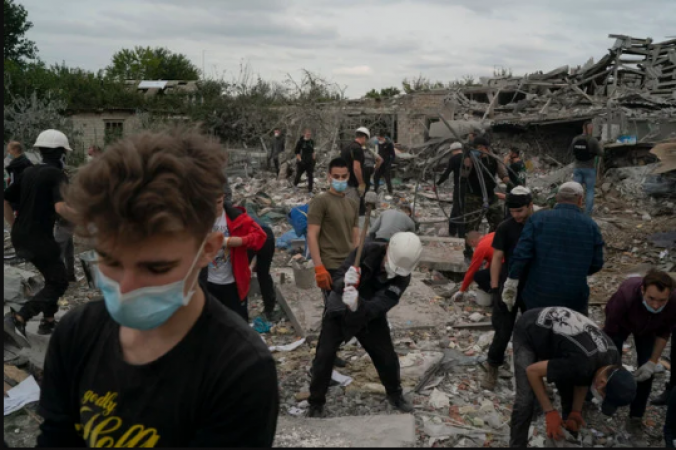
New York: A draft resolution condemning Russia's annexation of four regions of Ukraine will be discussed at the UN General Assembly on Monday as Western countries work to highlight Moscow's international isolation.
The decision to bring the issue to the General Assembly, where each of the 193 members of the United Nations has one vote and none has veto power, at a Security Council meeting on 30 September to block a similar resolution After Russia used its veto.
"This is extremely important," said Olof Skog, who drafted the text in collaboration with Ukraine and other countries while serving as the EU's ambassador to the international organization.
Also Read: Russia ostensibly retaliates by bombing Ukrainian cities
The Swedish diplomat told reporters that if the UN system and the international community did not respond to such an illegal attempt through the General Assembly, "we would be in a very bad place."
He said a failure by the General Assembly to act - a vote expected as of Wednesday - would give other countries "to do carte blanche in a similar way or to recognize what Russia has done".
A draft of the resolution obtained by AFP condemns Russia's "illegal occupation attempt" of the Ukrainian territories of Donetsk, Luhansk, Zaporizhzhya and Kherson after a "so-called referendum" and emphasizes that These acts "are not legal" stand under international law."
It calls for the immediate withdrawal of Russian forces from Ukraine and calls on all nations, international organizations and agencies to refuse recognition of the contracts.
Russia has responded by writing letters to all member states and criticizing "Western delegations" for their actions that "have nothing to do with the protection of international law and the principles of the United Nations Charter."
Also Read: Putin: Crimea bridge attack is a "act of terrorism." by Ukraine
They pursue only their own geopolitical goals, according to the letter, which was signed by Russian ambassador Vasily Nebenzia.
He criticized the "enormous pressure" that the US and its allies were, in his words, imposing on other member states.
Nebenzia suggested that, in light of the situation, General Assembly voting by secret ballot, a highly unusual practice usually reserved for decisions such as electing permanent members of the Security Council.
A senior official in US President Joe Biden's administration told reporters on condition of anonymity that Russia's attempt to disrupt the vote count "does not suggest a high degree of confidence in the result."
It shows some frustration, I guess.
According to General Assembly spokeswoman Paulina Kubiak, such a process would first require the vote of the member states - not by secret ballot.
As the foremost defender of United Nations principles, the Secretary-General outright condemned the annexation.
According to Antonio Guterres, it "stands against everything the international community must stand for."
It violates the objectives and guiding principles of the United Nations. This is a risky growth. It has no place in the contemporary world. It should not be tolerated.
Also Read: Trump Requests Peace Talks Between Russia and Ukraine to Avert Third World War
The US official claimed that these comments "show that this is not really about the West versus Russia."
No other country supported Russia during the Security Council vote, but four delegations - China, India, Brazil and Gabon - did not participate.
Many developing nations may be tempted to join those who have complained that the West is focusing only on Ukraine this week.
The results of the vote will show how isolated Russia has become. Given the high stakes, supporters of the draft are doing everything possible to impress potential abstainers.
"It's going to be tough," a top European diplomat said, speaking under condition of anonymity.
"Roughly 100 people voted in favor of the proposal for annexation of Crimea in 2014. I think we will get more this time," he predicted, putting the total number of votes from 100 to 140.
In March two prior General Assembly resolutions condemning the Russian invasion received 141 and 140 votes in favor (from Russia, Belarus, Syria, North Korea and Eritrea), 35 and 38 abstinence, and five votes in favor. Did it
With little consensus, a third vote was approved in April to remove Russia from the United Nations Human Rights Council.
58 votes were against, 24 were against and 93 were in favor.
While its goal is to "get Ukraine off the map," the main question for a US official this week will be "who is going to vote with Russia."